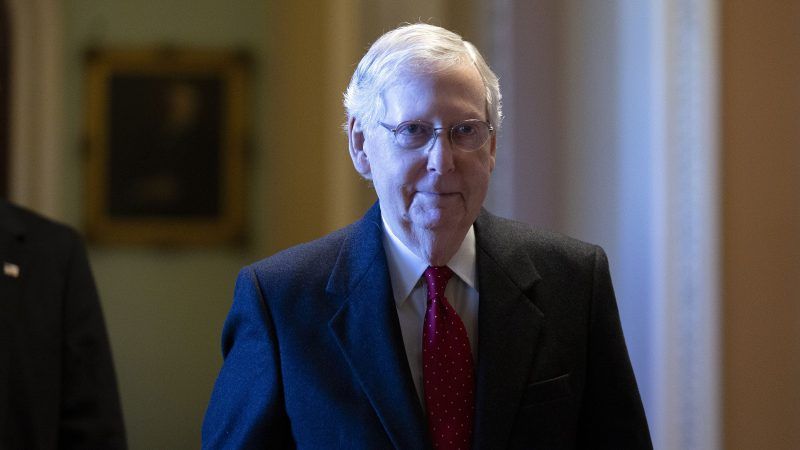'Checks for All' Prioritized Over Unemployment Benefits in Latest COVID-19 Relief Bill
Plus: The FDA approves a new rapid at-home COVID-19 test, lockdowns in Victoria, Australia ruled a human rights abuse, and more...

Congress is inching closer to an agreement on a compromise COVID-19 relief package that will include renewed federal unemployment benefits and another round of checks being sent to all Americans.
On Wednesday, Senate Leader Mitch McConnell (R–Ky.) urged his Republican colleagues to pass a relief bill that includes one-time checks of either $600 or $700, in part to shore up public support for GOP candidates Sens. Kelly Loeffler (R–Ga.) and David Perdue (R–Ga.) in Georgia's January runoff election, reports The New York Times.
A vote on this package could come as early as Friday. That's the same day that Congress will have to pass a funding bill for federal agencies in order to avoid a government shutdown. The final price tag for this second relief bill is currently estimated at $908 billion.
In order to cover the cost of relief checks—a policy goal that's attracted support from as diverse a duo as Sen. Josh Hawley (R–Mo.) and Sen. Bernie Sanders (I–Vt.)—lawmakers have decided to go with a less generous extension of federal unemployment benefits.
HuffPost reports that the new bill will provide jobless workers with an additional $300 a week in expanded federal unemployment benefits for three months, instead of the four months included in a bipartisan relief bill from earlier this week that's serving as the basis for negotiations.
That $300 a week amount would equate to your average out-of-work person making roughly the same as if they were still working.
With a $300 unemployment supplement means, the typical unemployed person will make about as much as if they were working.
This includes benefits - not just wages - wage replacement would be >100%.https://t.co/AqogGmdmuw
cc/ @p_ganong pic.twitter.com/sl1fZix473
— Marc Goldwein (@MarcGoldwein) December 16, 2020
Trimming back unemployment benefits in favor of relief checks for the gainfully employed has sparked criticism in some quarters. "There's no reason whatsoever to pay for relief checks by cutting the incomes of jobless workers," Sen. Ron Wyden (D–Ore.) told HuffPost.
Meanwhile, some progressives in Congress are pretty miffed that these relief payments will only be $600 or $700, not the $1,200 that had passed as part of the CARES Act back in March. The Washington Post reports that Sanders could potentially grind the whole deal over the reduced checks.
Also included in this latest relief package is another $300 billion in aid to small businesses, $25 billion in assistance to emergency housing assistance, and a month-long extension of the federal eviction moratorium issued by the Centers for Disease Control and Prevention (CDC). That mortarium expires at the end of the year.
FREE MARKETS
The ever-pernicious Food and Drug Administration (FDA) has cleared Abbott Laboratories' rapid COVID-19 test, which costs $5 and can deliver results in minutes, for at-home use. That would be great news but for all the strings the FDA has attached to this approval.
Patients will still need to get a prescription for these at-home tests. They'll also have to pay an additional $20 for a virtual appointment with a doctor who will supervise them administering the test.
Neither of those conditions makes any sense whatsoever, as the Cato Institute's Jeffrey A. Singer wrote in November:
Forcing people to get a prescription for the at‐home COVID test burdens them with the expense in time and money of going to a doctor's office to get the prescription when they don't even need the doctor to perform the test. It also subjects them to the risk of contracting COVID, if they don't already have it, from other patients in the waiting room or lobby. In short, it erases many advantages of an at‐home test.
The added cost and hassle of actually using these at-home tests will inevitably dissuade some people from getting tested altogether. That means more uninfected folks will needlessly isolate themselves, or people who unknowingly have the virus will go about their business as usual. Neither outcome is great for those who are eager to safely and quickly return to normal life.
LOCKDOWNS
The state government in Victoria, Australia imposed some of the most draconian lockdown restrictions in the developed world. A new state government report has criticized that harsh policy for violating the rights of public housing residents.
Reports The New York Times:
The sudden lockdown this summer of nine public housing towers in Melbourne that left 3,000 people without adequate food and medication and access to fresh air during the city's second coronavirus wave breached human rights laws, an investigation found.
The report, released on Thursday by the ombudsman in the state of Victoria, of which Melbourne is the capital, said that the residents had been effectively placed under house arrest for 14 days in July without warning.
QUICK HITS
- Greg Braxton of the Los Angeles Times is concerned that not enough Christmas movies this year are about the deadly pandemic we've suffered through for the past nine months.
- Are airports romantic? The Washington Post says yes.
- The Irish government is planning to criminalize sharing very vaguely defined "hate speech" on social media.
https://twitter.com/conorduffy_7/status/1339545010686062593
- Regulations are preventing Portland's food carts from reopening during the pandemic.
- Sheep have taken control of a city hall in Nevsehir, Turkey. Let's hope they don't ram through baaaad legislation that fleeces taxpayers.
Welcome to Neveshir, #Turkey where 1 sheep, 1 goat and 3 lambs have taken control of the City Hall:
pic.twitter.com/NoRd9xqIES— Joyce Karam (@Joyce_Karam) December 16, 2020
Rent Free is a weekly newsletter from Christian Britschgi on urbanism and the fight for less regulation, more housing, more property rights, and more freedom in America's cities.


Show Comments (394)